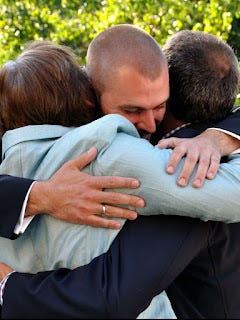Touch
“Just hold my hand.” She asked as she gasped for breath behind her oxygen mask.
I was visiting a friend in hospital in her final days earlier this year. She could hardly move, and I’d been trying to sort out her phone so she could listen to some of the messages she’d received, but all she really wanted was to feel the touch of another human being. So, whilst one of our amazing NHS nurses was cheerfully checking the equipment and testing her oxygen levels, I stood by her bed and spoke about anything that came to mind, whilst I gently held her hand (through my plastic glove).

Touch is a basic human need… a need that we’ve all been deprived of in this last year. There are so many big things we’ve lost in these last 12 months (loved ones, jobs, access to school, gatherings with friends and family) that we can lose sight of the smaller things we’ve also lost. To help stop the spread of Covid-19 we’ve had to give up the handshakes, hugs, pats and gentle touches that enrich our relationships, deepen our friendships and were so much part of our normal daily lives. Compared to the big things, the loss of human touch seems trivial and yet scientists argue that touch is as essential to human survival as food and water.
Research shows that babies thrive and develop better when cuddled and massaged; affectionate touch lights up parts of the brain responsible for pleasure, releasing a cocktail of hormones, including dopamine, serotonin and oxytocin, that soothe anxiety and make us feel happier. Other studies show that healthy adults who are hugged more frequently are less likely to get colds, perhaps because people who feel cared for are less likely to fall ill. From birth, touch stimulates our security, growth and development; through life, touch is essential to our wellbeing; in death, touch is comforting to those that are dying as well as to those that are bereaved.
Social distancing through the pandemic has robbed us of that basic human need, and studies show that lack of touch is linked to loneliness, depression, stress, mood and anxiety disorders and secondary immune disorders.
We aren’t all wired the same way, but I think lack of touch is part of why so many people are finding this third lockdown so much harder; we are suffering the long-term effects of missing all those little physical interactions that help renew and sustain us in our everyday lives. We are more technologically connected than ever before (WhatsApp, Zoom, Skype, Facebook Messenger and more, have all reported a massive spike in video calls), but many of us are still feeling bereft. It’s not human faces or voices we’re unconsciously longing for - it’s human touch.
I am fortunate enough to be able to hug my wife, but I still miss those little interactions with others, and I can only imagine how hard it must be for people that live on their own. Perhaps it is no accident that so many of the healing miracles we read about in the Bible involved touch.
The government roadmap gives us a clear hope for a much better summer in 2021; a summer where we can meet with friends and family again to share con
versation and meals and laughter and our grief… and handshakes and hugs!
Until then we need to be patient and work together to keep the rules for the next few months as the restrictions are gradually relaxed.
In the meantime, a few things that can help…
Ask for help – if you are feeling low, please ask for help. Sometimes asking for help seems one of the hardest things we can do, but you don’t need to struggle alone. If you are unsure who to speak to, please contact me. We have a great pastoral team in the area and there are also many other mental health charities that we can signpost
Imagine – imagine what it will be like to be together with people again, to be free of social distancing and to truly share time with others you love. This will happen... and it is not far away.
Virtual hugs – Psychotherapist Lucy Beresford recommends trying a virtual hug when video calling friends or family. “Virtual hugs sound weird, but are actually good for you precisely because they are so hilarious – and laughter is the perfect stress-release,” she says. “When you next have a video call with friends or family, make time to hug yourself to them, and they back to you.”
Prayer – (I know, I said that last month… but it works). Taking time to pause, to sit comfortably, to breathe slowly and deeply, to give God your tensions and anxieties, to breathe in his peace, and ask him for his healing touch. Night prayer at 9pm each weekday on our Facebook Livestream page can be helpful in leading us through this type of prayer.
I joke about looking forward to the pubs being open again (and I am), but I most look forward to sharing a hug with family and friends again. Praying for us all as we navigate this last part of the pandemic.
Rev Barry Jackson



